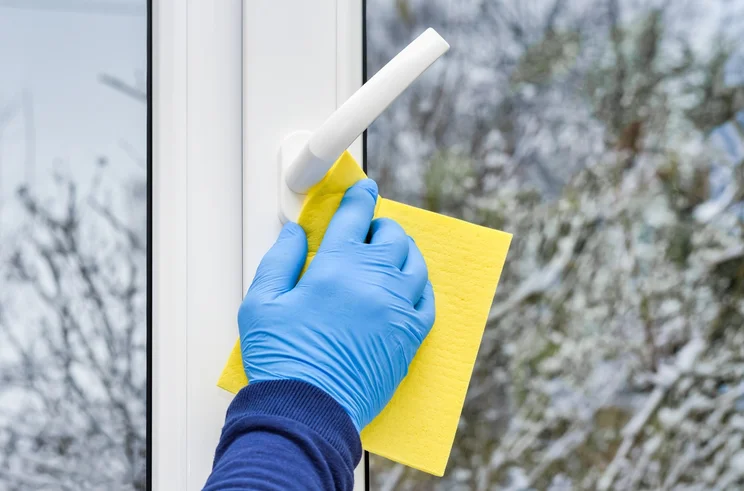Professional window cleaners use a blend of modern technology, specialized techniques, and carefully chosen cleaning mixtures to achieve flawless, streak-free windows in all weather conditions. Their mixtures—and the tools and skills paired with them—are tailored to tackle the unique challenges of Ireland’s rainy climate, hard water deposits, and high humidity.
Industry-Standard Solutions
Most professionals today rely on pure (deionized) water systems for exterior windows. These systems remove all minerals and impurities from water, preventing streaks and spots and reducing long-term damage from mineral buildup. This water is pumped through telescopic poles, allowing even high or hard-to-reach windows to be cleaned safely from the ground. The absence of chemicals makes this process eco-friendly and leaves glass sparkling and residue-free.
For interiors or especially dirty areas, a diluted glass cleaning soap or a neutral detergent is used. These solutions are designed for effective grease and dirt removal while reducing the risk of streaks. Only a small amount is diluted into a bucket of cool water—a little goes a long way. The solution is applied using a microfiber sleeve, then removed with a squeegee, and edges are buffed with a dry microfiber cloth for a professional finish.
Adaptation to Irish Conditions
Due to frequent rainfall and humidity, Irish window cleaners may use additives with mild anti-mould or anti-limescale properties. In rural or coastal areas with harder water, slightly acidic cleaning agents—occasionally a vinegar-water solution—might be incorporated to combat stubborn mineral stains. Choosing pH-neutral and biodegradable cleaning products is now common, aligning with Ireland’s ongoing focus on sustainability.
Key Techniques for Flawless Finish
Success depends on more than the right mixture. Professionals clean on overcast days to prevent rapid drying and streaking, always work from top to bottom, and use overlapping strokes with a squeegee for a streak-free shine. Extendable poles, precision equipment, and careful planning enable efficient, safe cleaning of even difficult or high windows. Regular maintenance, a focus on preparation (removing dust and cobwebs from frames), and attention to detail are all hallmarks of the professional approach.
Is vinegar and Dawn good for cleaning windows?
Using vinegar and Dawn dish soap as a window cleaning solution is a popular DIY method that can deliver great results, especially for tackling tough Irish weather grime and water spots. However, there are both pros and cons to consider before using this homemade mixture on your windows.
What Mixture Do Professional Window Cleaners Use?
Mixture Preparation and Ratios
The foundation for most professional window cleaning starts with pure or deionized water, which is free from minerals that cause streaks and residue. For exterior work, especially with water-fed pole systems, pure water alone is often all that’s needed. For interior glass or stubborn dirt, professionals add a precise amount of neutral detergent or commercial glass soap to a bucket of water—typically, two teaspoons of concentrated cleaner per bucket will suffice, but this may vary depending on the product. Overuse of detergent is carefully avoided, as it can lead to smearing and attract new dirt.
To boost cleaning power on very dirty or greasy windows, a few drops of mild washing-up liquid are sometimes added. For targeted stain removal—such as hard water spots—white vinegar is occasionally mixed in, often at a ratio of one part vinegar to four parts warm water. The solution is stirred gently and poured into a spray bottle for ease of indoor use.
Step-by-Step Mixture Preparation
- Prepare Equipment: Gather a clean bucket, squeegee, microfiber cloths, and, if needed, a spray bottle for interiors.
- Mix Solution: Add pure water to the bucket, then mix in the recommended amount of professional window cleaning concentrate or a few drops of washing-up liquid.
- For Stubborn Spots: Add diluted vinegar if addressing mineral stains, but only when needed.
- Stir Gently: Avoid creating excess suds, which can lead to streaking.
- Pour for Application: Use a spray bottle for small areas or interior work; dip applicators directly for larger panes.
Application Tips: Professionals start by removing dust and cobwebs from frames to prevent scratching.
They apply the cleaning mixture evenly using a microfiber applicator, then squeegee in precise, overlapping motions—always from top to bottom—before buffing edges with a dry, lint-free cloth. The process is finished with a final inspection under natural light to catch missed spots or streaks.
FAQ: Professional Window Cleaning Mixtures
What’s the advantage of using pure water?
Pure water leaves no streaks, spots, or residue because all minerals are removed—especially effective for exterior glass.
Why is detergent used sparingly?
Too much detergent can leave film and attract dust; the goal is just enough to break up dirt without causing streaks.
Can you add vinegar to the mix?
Yes, for tough mineral stains, but only in moderation and mainly for interiors or specific trouble spots.
How do professionals ensure safety and effectiveness?
By preparing solutions in the right ratios, working on cloudy days to avoid rapid drying, and using extendable poles to safely reach higher windows.
Is the mixture safe for homes with pets and children?
Most pro-grade window cleaning mixtures are biodegradable, non-toxic, and safe when mixed as directed.
Unique Professional Insights
- Professionals routinely inspect their cleaning mixture for clarity—cloudy or overly sudsy water signals it’s time for a fresh batch.
- Soft, high-quality microfiber applicators are preferred over sponges or paper towels to ensure no lint or scratches.
- Some Irish window cleaning crews will tailor solutions for local water conditions—slightly acidic for hard water areas, and pH-neutral for homes with soft water pipes.
By blending premium mixtures, careful technique, and localized preparation, Irish window cleaners achieve sparkling results—rain or shine.




